Trump Signs Resolution to Reverse DeFi Tax Reporting Rule
In a significant move that has sparked both relief and optimism within the DeFi industry, former President Trump signed a resolution to reverse the controversial IRS rule aimed at enforcing crypto tax compliance. The rule, which faced intense backlash from DeFi proponents, was criticized for its technical challenges and potential negative impact on the rapidly growing decentralized finance sector.
The IRS rule, introduced with the intention of bringing clarity and accountability to the taxation of cryptocurrencies, particularly decentralized finance (DeFi) protocols, had inadvertently created confusion and uncertainty among DeFi users and developers. DeFi, known for its decentralized nature and innovative financial solutions, operates on blockchain technology, making traditional tax reporting methods difficult to apply seamlessly.
The DeFi industry, which has been gaining momentum in recent years, offers a wide range of financial services without the need for traditional intermediaries. This decentralized model not only provides users with greater control over their assets but also poses challenges for regulators seeking to ensure tax compliance without stifling innovation.
One of the primary concerns raised by critics of the IRS rule was its potential to stifle innovation and drive DeFi projects away from the United States. The technical complexities of applying traditional tax reporting requirements to decentralized finance platforms could have hampered the growth and development of this emerging sector, pushing developers and users to seek more favorable regulatory environments elsewhere.
The reversal of the IRS rule by President Trump comes as a welcome development for the DeFi community, signaling a willingness to reevaluate regulatory approaches and engage in meaningful dialogue with industry stakeholders. By acknowledging the unique challenges posed by decentralized finance and committing to a more collaborative regulatory framework, policymakers have taken a crucial step towards supporting innovation while ensuring tax compliance.
Moving forward, it will be essential for regulators to work closely with industry experts and stakeholders to develop clear and practical guidelines for tax reporting in the DeFi sector. By fostering open communication and collaboration, regulators can create a regulatory environment that balances innovation and compliance, enabling the continued growth and success of decentralized finance projects.
The reversal of the IRS rule highlights the importance of regulatory agility and adaptability in the fast-paced world of digital innovation. As technologies like blockchain and decentralized finance continue to reshape the financial landscape, policymakers must be willing to engage with industry stakeholders, listen to their concerns, and adjust regulatory frameworks accordingly to support innovation and growth.
In conclusion, the decision to reverse the IRS rule targeting DeFi tax reporting represents a positive step towards fostering innovation and regulatory clarity in the decentralized finance sector. By recognizing the unique challenges posed by DeFi and engaging in constructive dialogue with industry stakeholders, policymakers can create a regulatory environment that supports continued growth and development in this rapidly evolving space.
DeFi, IRS, Tax Compliance, Blockchain, Decentralized Finance
